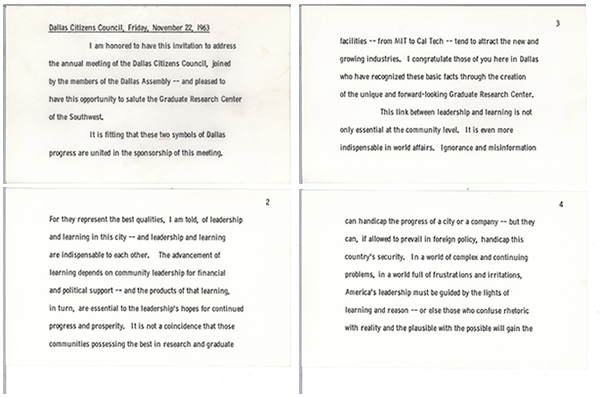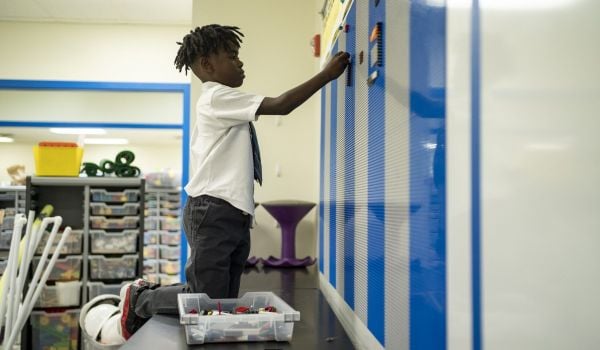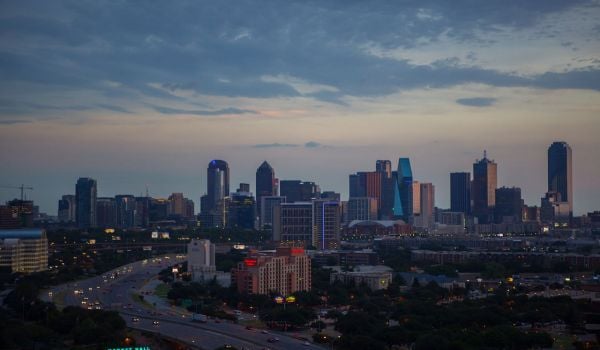“It is not a coincidence that those communities possessing the best in research and graduate facilities — from MIT to Cal Tech — tend to attract new and growing industries. I congratulate those of you here in Dallas who have recognized these basic facts through the creation of the unique and forward-looking Graduate Research Center.”
When President John F. Kennedy was shot in Dallas’ Dealey Plaza 50 years ago today, he was about a half an hour from delivering a speech at Trade Mart, the city’s trade center and exhibition hall. Kennedy was scheduled to address a luncheon event sponsored by the Dallas Citizens Council and the Graduate Research Center for the Southwest.
Largely written by Kennedy speechwriter Ted Sorensen, the talk would come to be known as “The Unspoken Speech.” Read today, it has a particularly modern ring: Kennedy intended to draw a connection between technological education and social advancement. It brings to mind President Obama’s oft-mentioned focus on increasing education in science, technology, math and engineering. But the idea that high-level education has the capacity to redeem a place has echoes, too. It brings to mind, for instance, New York City Mayor Michael Bloomberg’s push to open a “tech campus” on Roosevelt Island, in conjunction with Cornell University and Israel’s The Technion, driven by the notion that advanced education centers can help pull cities into the future.
The Graduate Research Center of the Southwest had just opened in 1961 as a project of the founders of Texas Instruments. Its roots were on a late-night flight from Dallas to New York in 1958, when, according to University of Texas historians, T.I. co-founder Erik Jonsson and geophysicist and engineer Lloyd Berkner “discussed the need for additional Ph.D. trained professionals in the southwest to meet the increased demands in the workforce placed by advances in technology.”
The campus, located in Richardson, just north of Dallas, would in 1967 become the Southwest Center for Advanced Studies. In 1969, it would become the basis for the University of Texas at Dallas. Kennedy had, in fact, intended to visit the campus on his trip to Dallas, but the plans were scrapped when they couldn’t fit into his schedule. Nearly all of the scientists from the center were in the audience of 2,500 at Trade Mart that day, waiting for Kennedy to arrive.
The subtext of Kennedy’s undelivered speech was a push back against his most adamant opponents in Dallas, those who accused him of being dismissive of both Dallas and the Constitution, an ivory tower elitist, and possibly a Communist sympathizer. Kennedy seemed to suggest that the value of the enlightened education pursued at the Graduate Research Center of the Southwest — “these basic facts,” as he would have put it — was what his political opposition should focus on, should they hope to survive. “The advancement of learning depends on community leadership for financial and political support,” reads the prepared text of the Trade Mart speech, “and the products of that learning, in turn, are essential to the leadership’s hopes for continued progress and prosperity.”
But Kennedy also found in Dallas lessons for the global stage:
This link between leadership and learning is not only essential at the community level. It is even more indispensable in world affairs. Ignorance and misinformation can handicap the progress of a city or a company, but they can, if allowed to prevail in foreign policy, handicap this country’s security. In a world of complex and continuing problems, in a world full of frustrations and irritations, America’s leadership must be guided by the lights of learning and reason — or else those who confuse rhetoric with reality and the plausible with the possible will gain the popular ascendancy with their seemingly swift and simple solutions to every world problem.
Read the rest of Kennedy’s undelivered speech here.

Nancy Scola is a Washington, DC-based journalist whose work tends to focus on the intersections of technology, politics, and public policy. Shortly after returning from Havana she started as a tech reporter at POLITICO.










